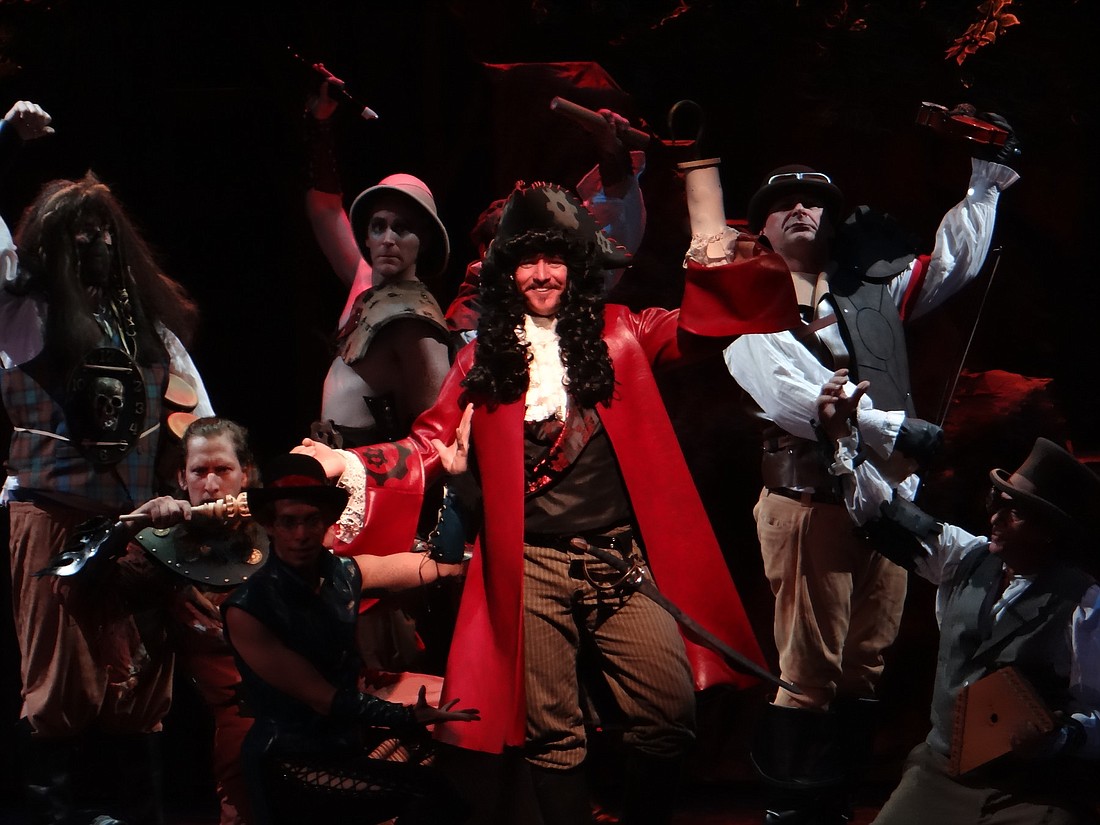- January 14, 2025
-
-
Loading

Loading

Peter Pan is alive and well and flying at Manatee Players. He’s the boy who wouldn’t grow up and needs no introduction. Peter Pan is so archetypal that it’s hard to believe he popped out of J.M. Barrie’s imagination in 1902. Unknown then, but highly known now. Thanks to Disney, Mary Martin and a host of stage and screen adaptations, unless you’ve been kidnapped by pirates and held for ransom your whole life, it’s a good bet that character and his story are imprinted on your brain. Just in case, here’s the ridiculously short version …
Basically, Peter Pan (Anna Trinci) and his sidekick Tinkerbell (a fairy played by a floating light) fly off with Wendy, John and Michael Darling, (Zoe Verbil, Stevie Romero and Atticus Pratt), three British children raised by a loving mother (Wendy Brown), an overbearing father (Greg Wiegers), and a dog (Brandon Kash Jamora). Pan takes these kids to Neverland, a realm where kids never grow old. After adventures with pirates, Indians and the Lost Boys, Peter Pan returns the kids unharmed. He promises to return for Wendy, but forgets, and returns for her daughter. They fly off, and the story repeats itself.
Anna Trinci carries the show as Peter Pan. She flies through the air with the greatest of ease; it’s a performance of such lightness and grace you could easily miss the sheer athleticism involved. Flying aside, Trinci nicely channels Peter Pan’s impulsive, boastful, narcissistic, cocky character. Holly Rizzo (a dead ringer for Summer Glau) shows true star quality as Tiger Lily and is a great dancer in her own right.
Wiegers clearly had great fun in the dual roles of the father and the pirate. (What would Freud say about that, anyway?) Scott Vitale puts in a smart comic performance as Smee, Hook’s put-up second in command. The supporting cast (as Indians, Lost Boys and Pirates) were all spirited and in-the-moment, as well.
“Peter Pan” is, of course, a musical adaptation of Barrie’s source material — the Mary Martin vehicle that hit Broadway and flickered across the airwaves in the 1960s. Like Peter Pan’s character, the songs, too, never grow old — “I’ve Gotta Crow,” "Tender Shepherd," "I Won’t Grow Up," and “Never Never Land,” to name a few. Musical Director Michelle Neal puts a fresh spin on these nostalgic favorites. Her take on “Ugg-a-Wugg” is a stand-out. Its original patronizing iteration could earn protests from the American Indian Movement. Her update is a high-energy celebration of the life force when the Lost Boys and Indians merge their tribes. Nicely done.
And the dancing strikes the same high level. Choreographer Geena Ravella makes you feel the joy of living in the place where nothing is ever planned. She’s equally delightful in the dances of the sleazy, cheesy Pirates, tarantella or tango, depending on Captain Hook’s mood.
The Pirates, of course, are stand-ins for rotten adults; a note of darkness in the symphony of childish joy. And absolutely necessary if this musical is going to work.
Like flying, putting on a successful production of “Peter Pan” is not as easy as it looks. To work, the musical has to strike a delicate balance between sugary, sentimental whimsy and sneering camp. Director Steve Dawson takes the material seriously, but not too seriously (as Hook’s capers prove).
Neverland, of course, is a no-rules realm of indulgence and adventure. It’s a big spree. But there are pirates. Comic pirates, yes. But they do want to kill the children. Despite all the fun, the children do want their mothers. In the final scene (drawing from Barrie’s novel, which came after the play) Peter promised to return to Wendy. But, like any boyish brat, he forgets and doesn’t arrive for decades. Wendy is “ever so much older than 20.” Peter blames her for growing up. But she couldn’t help it. For Wendy, there’s no going back to Neverland.
Behind all the fun and fairy dust, there’s a subtle undercurrent of sadness and loss. The Lost Boys; the Darling’s loss of their children; the loss of childhood itself. And, of course, Hook’s lost hand, which Peter Pan severed.
My inner intellectual longs to explore the implications of the Oedipus complex and castration anxiety. But that’s not really the point. You don’t need a degree in post-structuralist hermeneutics to know that Neverland stands for the lost kingdom of childhood imagination. The Indians and Pirates are the inventions of childish minds in late Victorian Britain.
Like Utopia, Neverland is literally “no place.” Or perhaps, “no when.”
It’s the Kingdom of Lost Time.
Here, the dangers aren’t real.
Except for growing up, of course.
IF YOU GO
“Peter Pan” runs through Dec. 22, at Manatee Performing Arts Center, 502 Third Ave. W., Bradenton. Call 748-5875 or visit manateeplayers.com for more information.